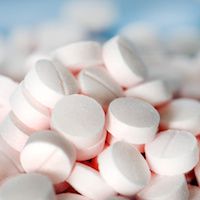Article
Death is Inevitable But Premature Death is Not: Efficacy of Low-dose Aspirin
Author(s):
"Is this the end of the road for aspirin in primary prevention?" asked Dorairaj Prabhakaran, MD, DM, MSc, at the 2014 American Heart Association (AHA) Scientific Sessions.

“Is this the end of the road for aspirin in primary prevention?” asked Dorairaj Prabhakaran, New Delhi, India at the American Heart Association (AHA) Scientific Meetings 2014.
Prabhakaran was the primary AHA discussant of Kazuyuki Shimada, MD’s study examining the efficacy of low-dose aspirin for primary prevention of cardiovascular events in Japanese elderly patients with multiple atherosclerotic risk factors that had no previous history of atherosclerotic disease (ASCVD).
A total of 14,466 patients aged 60 to 85 years with hypertension, high cholesterol, or diabetes were randomly allocated to receive enteric-coated aspirin, 100 mg/day or no aspirin.
Results found at a median follow-up 5 years no significant difference between the 2 groups in the number of primary events or the risk of event. The 5-year cumulative event rates were also 2.772% for the aspirin treated group compared to 2.960%, for the no-aspirin group.
Shimada and his team had thus concluded aspirin was not associated with significant reduction in total cardiovascular events in elderly patients with multiple cardiovascular risk factors.
Prabhakaran hypothesized the study actually stopped as a result of futility: the number of primary end points was insufficient for the study to reach statistical power. Additionally, primary prevention with low dose aspirin did not reduce the overall risk of atherosclerotic events in elderly Japanese patients with or without risk factors.
Observing the negatives, Prabhakaran believed there was a clear lack of power, “The number of events that were needed did not approve this trial. However, even if we had allowed the trial to go to its full course and even beyond the reach of the necessary power, will it have been clinically meaningful?”
Prabhakaran also noted statins overrode the benefits of aspirin, because in the current era with statins being used so often, the risk had decreased substantially. Where there is a high risk for cardiovascular disease outcome, the benefits are substantial.
On whether it is the end of the road for the aspirin in primary prevention, Prabhakaran commented, “The benefit is unlikely in very low risk populations such as people with less than 1% events per year. There could be a road in special groups particularly younger populations, which have not been evaluated well from other countries such as India where the risk of coronary heart disease is extremely high.“
There had been a pragmatic approach provided by the American Physicians Association, which determined aspirin is unlikely to be beneficial based on a population below 10%. However, there is a gray area, requiring a trial, but currently one could use aspirin weighing the benefits and risks while individualizing patients.
Prabhakaran concluded, “Death is inevitable but premature unwanted death is not. In reducing premature death, aspirin is the most inexpensive option and we should pursue with rigor in identifying individuals who may benefit."





